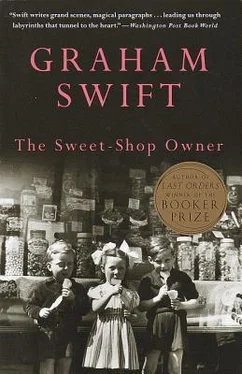Graham Swift - The Sweet-Shop Owner
Здесь есть возможность читать онлайн «Graham Swift - The Sweet-Shop Owner» весь текст электронной книги совершенно бесплатно (целиком полную версию без сокращений). В некоторых случаях можно слушать аудио, скачать через торрент в формате fb2 и присутствует краткое содержание. Год выпуска: 2012, Издательство: Vintage Books USA, Жанр: Современная проза, на английском языке. Описание произведения, (предисловие) а так же отзывы посетителей доступны на портале библиотеки ЛибКат.
- Название:The Sweet-Shop Owner
- Автор:
- Издательство:Vintage Books USA
- Жанр:
- Год:2012
- ISBN:нет данных
- Рейтинг книги:4 / 5. Голосов: 1
-
Избранное:Добавить в избранное
- Отзывы:
-
Ваша оценка:
- 80
- 1
- 2
- 3
- 4
- 5
The Sweet-Shop Owner: краткое содержание, описание и аннотация
Предлагаем к чтению аннотацию, описание, краткое содержание или предисловие (зависит от того, что написал сам автор книги «The Sweet-Shop Owner»). Если вы не нашли необходимую информацию о книге — напишите в комментариях, мы постараемся отыскать её.
The Sweet-Shop Owner — читать онлайн бесплатно полную книгу (весь текст) целиком
Ниже представлен текст книги, разбитый по страницам. Система сохранения места последней прочитанной страницы, позволяет с удобством читать онлайн бесплатно книгу «The Sweet-Shop Owner», без необходимости каждый раз заново искать на чём Вы остановились. Поставьте закладку, и сможете в любой момент перейти на страницу, на которой закончили чтение.
Интервал:
Закладка:
Her lips hovered over the rim of her cup. Her face had this way of seeming to float.
And all I ask in return for this is that there be no question of love.
She fingered the pearls at her neck, drawing in her shoulders. And only for an instant had there flickered in her eyes that other look which he could never reach, never touch, never quite rescue: ‘Save me.’
The blue and pink tea service glimmered on the table, and she cut the cake — a Dundee — with the ivory handled slicer on the cut-glass cake stand. So many presents. You ate off them, sat on them, slept between them. That lavish family of hers. Furniture, china, glass, bed-linen; not to mention the house itself, the garden, with the lilac tree and hydrangea bushes, or her furs and jewels, most of which she kept locked in cupboards and drawers and never brought out, as if condemning them. But it was all for her, the only daughter. Not for him. She liked fine, fragile, precious things, things which you couldn’t use. And he had the podgy hands of one who would let slip such things and break them. And, besides, (he’d overheard what her brothers had said, at the wedding reception) he was ‘only something to occupy her with’.
‘Don’t worry,’ she said, ‘don’t worry about the nonsense that family talks.’
They posed for photographs. June, 1937. There was a marquee in the garden, smoked salmon, turkey and champagne; and the feeling you get on a journey when some landmark looms into view, soon to be passed by. A scent of cut grass; red and white carnations. The chatter rustled like a breeze through the hats and flowers. Her brothers were there, Paul and Jack, with wing-collars, moving smoothly among the guests, as if their sister made a habit of getting married and they had done it all many, many times before. His parents sat, along the table, looking flushed and attentive. They would be dead soon, one after the other, as if by mutual arrangement, in a space of months. But tonight, when it was all over, they would have the neighbours round and, amidst bottles of gin and beer, they would dance, that quiet pair, on the worn carpet in the back room. Yes, better do it now, better rejoice; our son’s wedding night, that is something to celebrate. They had scraped every penny, in those stringent times, so as not to be outdone, to give the set of silver cutlery which stood on the damask tablecloth on the trestle table amongst the other gifts. But what they most gave, silently, generously, was their thanks.
Her parents whispered gravely to each other, as if the event were for them the completion of some shrewd act of diplomacy. And should he cast his eyes a moment their way, they would break off their discussion, in deference to his place of honour, and give him wide, immaculate, approving smiles. They had made their money out of immaculacy; out of little laundries dotted about the streets of south-east London. They had contracts with hotels, shipping lines. And they’d won their custom on the promise of whiteness: white sheets and white shirts, white pillow-slips; as white as the white wedding cake that rose in icy tiers before them. And the brothers, who had partnerships, investments, interests of their own, smiled too, the same smile, approving, not friendly. Yes, he’d do. He’d do for a bride-groom. To have a wedding you needed a bride-groom.
He felt like someone borrowed for the occasion.
But he didn’t mind. That condescension. Not when, with his head growing lighter, he’d stood up to make his speech and said simply, gawping: ‘Thank you, thank you … thank you really, thank you all.’ That was all that was expected of him, and they’d clapped and cheered as at masterly oratory. Nor when, after more champagne and words with relatives he didn’t know and wouldn’t meet again, he had wandered through the house like a stranger, and heard her mother say to another — he caught no more — ‘a difficult girl’, and had glimpsed afterwards, upstairs, through the half open door, Paul on the bed and Jack in a chair, their waistcoats undone and their grey ties pulled loose from their collars, like weary gamblers, and eavesdropped on those words that passed between them. No, he didn’t mind. Landmarks were like that. They slipped by. They did not belong to you. And if you put out your hand to touch them, they parted and dissolved and grew flimsy like the world after champagne. And he didn’t care. For in the night now, his body sprawled like a toy’s, the world receded, he could reach out and touch her.
‘Don’t listen to all that nonsense, Willy.’
‘Something to occupy her with.’
So why then? Why him?
He watched the cigar smoke drifting through the beams of sunlight over the counter.
He had planned nothing. Not for himself. And yet he knew: plans emerged. You stepped into them.
That was why he liked it at Ellis’s. The print-works. Setting up the type so that there was correctness of spacing, the letter size graded according to the importance of the words; an overall effect of regularity and order. The content was unimportant. It was the layout that mattered. And just to show it was not a mere exercise, a playing with shapes, you had to roll up your sleeves and get your fingers covered in ink or machine grease. There was always a little mess, if there were patterns. Old Ellis called him ‘my lad’. He had a bald head and a thick, drooping, melan-choly moustache. They were disappointed, of course, Mother and Father. Had they got him to grammar school just for that? (‘Lacks talent and initiative,’ his reports had said.) Where was the return for their scrimping and pushing? But he liked the daily routine, the taking of orders, the clattering machine room at the back with the grille-like window overlooking the Surrey canal, and almost jaunted to work, on and off the tram, with a concealed laugh inside him.
He planned nothing, though every day had its pattern and was spent in making patterns. Until she came in that day — Mr Ellis was at lunch and he had temporary charge — to place her order.
‘Laundry lists,’ she said. ‘The laundry lists and other material for our new branch. Mr Ellis was phoned, and I’d hoped …’
She looked peeved at not being able to see the proprietor; annoyed at the grubby little print-works and him in his shirt sleeves with inky fingers; and annoyed too at having been sent out like an errand girl on this mission. For that showed. Someone who might have sent an assistant, an office boy, had deliberately sent her and she didn’t like it. She was meant to command, not obey.
‘You had better attend to it.’ And she did command, and he obliged. ‘This is what we want.’
He took the typed-out sheets and scanned them through, his pencil poised. It was only the simplest of things, a laundry list, but as if to show, since she was to command, that he was slow, had no initiative, he read aloud the words in front of him:
‘… Waistcoats, Men’s Shirts, Collars (stiff), Collars (semi-stiff), Vests (long-sleeved) —’
But she stopped him. ‘That’s a fine little rag-doll.’ It was meant to be peremptory. Her lips drew inwards. But he grinned as though at a quite good-humoured remark. And no, he wouldn’t be bothered by her cuttingness. It wasn’t what it seemed.
He took the papers and showed her the samples of lettering and layout, explaining slowly, for that was his way. And she listened, never for one moment losing that air of authority, yet held, perhaps, by his simpleton’s manner, by his ungrudging deference. Her hand drew in her collar. ‘Yes,’ she said curtly, ‘Yes, yes.’ And through his labouring words, as through a little mesh of visible dull print, he looked at her beauty.
When he saw her a second time, three days later, walking on the common, it was different. Twice. That was pattern, that had the feel about it of something meant to be. She was leaning on the railings overlooking the space where the children played on swings, roundabouts and see-saws, and she had the same look of someone sent unwillingly on an errand, loitering resentfully. So he must stop (a plan would emerge) and say, ‘Miss Harrison? How do you do?’ and, as she looked up, half in annoyance, half with the look of a girl caught playing truant, continue in his dumb way, ‘Passing by … er, lunch-time … couldn’t help … laundry lists are ready.’ And she, recognizing who he was, recovering that old command, must nod, say, ‘Ah yes,’ and turn her head away to look over the railings. She would let him linger, if he must, but she wouldn’t welcome him.
Читать дальшеИнтервал:
Закладка:
Похожие книги на «The Sweet-Shop Owner»
Представляем Вашему вниманию похожие книги на «The Sweet-Shop Owner» списком для выбора. Мы отобрали схожую по названию и смыслу литературу в надежде предоставить читателям больше вариантов отыскать новые, интересные, ещё непрочитанные произведения.
Обсуждение, отзывы о книге «The Sweet-Shop Owner» и просто собственные мнения читателей. Оставьте ваши комментарии, напишите, что Вы думаете о произведении, его смысле или главных героях. Укажите что конкретно понравилось, а что нет, и почему Вы так считаете.












